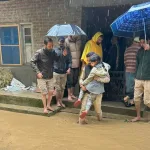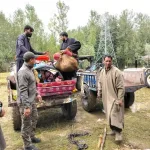A few years ago, agriculture was considered the backbone of Kashmir’s economy. This was largely due to the lack of attention given to the region’s unseen and unexplored tourist destinations, as well as the continuous violence that chocked the Valley.
In recent times, however, tourism has emerged as a new ray of hope, not only reviving the sector itself but also transforming into a growing industry. This revival has brought with it opportunities for local engagement, economic development, and employment for the people of Kashmir.
The recent terror incident at Pahalgam was both inhuman and deeply condemnable. It not only opened the eyes of the Kashmiri people to the real enemies of peace but also united them in protesting with one voice against terrorism.
The severity of the incident was such that, for the first time since World War II, two countries engaged in a dogfight. This sudden escalation disrupted the hard-earned peace in Kashmir — the paradise that had just begun to regain its scope for tourism. Once again, the people of Kashmir found themselves in the middle of the storm, becoming victims through no fault of their own.
The transformation of tourism through the opening of new tourist destinations, the concept of border tourism, mapping of unseen locations, and the development of infrastructure, roads, and other facilities had once again made Kashmir a paradise with a new face on the world map. The tourism boom in Kashmir had even surpassed some of the most beautiful places in the world.
The rapid growth of tourism had shifted Kashmir from extremism to moderation, from violence to peace, from a wounded paradise to a regained one. But now, all these hopes seem shattered, dashed to the ground due to the recent terror attack on innocent tourists.
While analysing the tourism flow post abrogation, it is comparatively higher than during the past thirty years of violence. Data shows that between 2021 and 2024, the resurgence of tourism brought approximately 99.9 lakh (9.99 million) tourists to the Kashmir Valley.
The graph indicates that 2022 recorded the highest number of tourists in Kashmir, with over 1.88 crore (18.8 million) the highest in the last 75 years. This growth was made possible due to peace in the valley, along with government initiatives to promote tourism, improved security, the development of new tourist destinations (Border Tourism) and infrastructure, and the historic G20 event.
The last four years have not only revived local engagement and the livelihoods of border residents, homestay owners, tour guides, the houseboat industry, transport operators, hotels, and laborers, but also benefited culture, crafts, skill development, local food vendors, photographers, and tour planners, engaging around 2 million people directly or indirectly in tourism-related activities.
Leaving the loss to the government and private sector aside due to the recent terror incident at Pahalgam, what truly matters is the loss of 20 lakh jobs and the livelihoods of common Kashmiris. This is a challenge that must be accepted by both the government and the people of the valley.
As a regular writer and promoter of tourism, I see this as a significant loss to the UT and the country at large. At the same time, it is a challenge to revive and we must accept this challenge for the sake of these 20-lakh people who have become jobless, and for the sake of these valleys that are awaiting tourists and remain isolated.
The tourism blackout is a slap on our faces for many reasons. First, Kashmir is called the paradise on earth due to its natural beauty. Second, Kashmiris are known for their hospitality and nobility across the country. Third, the revival of tourism now is not just about engagement or economy, but about removing the blot caused by the recent terror attack. Fourth, attacking tourism through terrorism is a serious challenge. Fifth, the crisis is being faced by none other than the Kashmiris themselves, and it must be the people of Kashmir who revive tourism.
The question is not who committed this cowardly act, the question is, why target tourists? Innocent, unarmed Kashmiris are not in a reasonable position to explain it, but they can do a lot, if not today, then never. The real government is the people who enjoy the benefits provided to them; therefore, it is the people who must come forward and save Kashmir from this grave period of crisis.
No doubt, the setback from this terror incident will take time to heal, but we need to put in our efforts to prove ourselves as Kashmiris and bring our identity back on track. What we can simply do is reclaim Kashmir’s identity as a peaceful tourist destination and rebuild trust and confidence. The government is a part of us; let’s make an effort to save tourism from terrorism.
Primarily, we need to build confidence among tourists, investors, and the general public through trust-based community actions. An emergency helpline should be established for tourists. Misinformation regarding violence must be dealt with seriously. National campaigns should be launched with slogans promoting peace and beauty. All of this should be amplified by bloggers and journalists to counter the fear-psychosis narrative at the national level, with a focus on eco-tourism, cultural tourism, and spiritual retreats.
Secondarily, a civil-government coordination committee should be constituted to oversee tourist safety and engagement. Tourist guides and travel agents must maintain close coordination with the tourism department.
The ‘Pahalgam Chalo’ campaign and related events should be supported with massive media-driven movements to attract attention and foster unity. Local residents should invite friends and family from outside the UT to visit, helping break the fear psychosis and re-establish social trust.
Thirdly, previously banned tourist destinations should be reopened, and untouched natural beauty must be explored with improved safety measures. Border tourism, which has become a voice for peace and a barrier to infiltration, must be resumed with necessary restrictions.
Kashmiris feel deeply disheartened by this terror incident and its aftermath, not just because of the economic loss, but because of the impact on their dignity, culture, and identity.
Let us join hands, coordinate with the people, and lead this revival. Only then can the valley truly heal from the wounds of violence and re-emerge as a symbol of peace, hospitality, and natural splendour.
Let us rise together and say tourism is our answer to terrorism.
(Author is a Columnist and can be reached at: [email protected])








